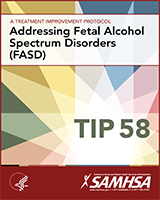Project CHOICES is an evidence-based intervention (Project CHOICES Intervention Research Group, 2003; Floyd et al., 2007) that targets women at risk of having an AEP before they become pregnant. The goal is to reduce drinking and/or prevent pregnancy through contraception.
The target population for Project CHOICES is women ages 18 to 44 who are sexually active and drinking alcohol at risk levels. The model uses a four-session intervention approach based in MI methods, and discussions in each session are tailored to the client's self-rated readiness to change and interest in discussing alcohol use or contraception.
Project CHOICES programs exist in multiple settings, including residential and outpatient substance abuse treatment, community mental health treatment, jails, and community-based teen programs for girls. Eligibility criteria include 1) self-report of being sexually active, 2) being non-pregnant (but able to conceive), 3) high-risk drinking (8 or more drinks per week or 4 or more drinks in one occasion) in the past 30 days, 4) ineffective use of or no contraception, and 5) not currently trying to become pregnant or planning to try in the next 6 months. | Intervention Components:
Four MI-based counseling sessions, including personalized feedback of risk, motivation to change one or both risk behaviors, decreasing temptation to engage in risk behaviors and increasing confidence to avoid them, goal-setting, and change planning; and One contraceptive counseling visit.
|
The Parent-Child Assistance Program (PCAP) is a scientifically validated (Grant et al., 2005) paraprofessional case management model that provides support and linkages to needed services to women for 3 years following enrollment. The goal is to reduce future AEP by increasing abstinence from alcohol and drug use and/or improving regular use of reliable contraception among enrollees.
The target population for PCAP is pregnant or post-partum women (up to 6 months) who have had an AEP and will self-report drug and/or alcohol use during the target pregnancy. The model is based in Relational Theory, the Stages of Change, and harm reduction.
PCAP programs exist in a variety of settings, including substance abuse treatment and family support centers. Eligibility criteria include self-report of heavy alcohol or illicit drug use during pregnancy and ineffective or non-engagement with community social services. | Intervention Components:
Paraprofessional home visitation; Goal-setting; Case management targeting alcohol use and contraception use; and Linkages to community services and programs.
Case management is provided at least twice monthly for up to 3 years following initial entry into the program. |
